#Sharp-Shooter on Picket Duty
Text
🎨Winslow Homer
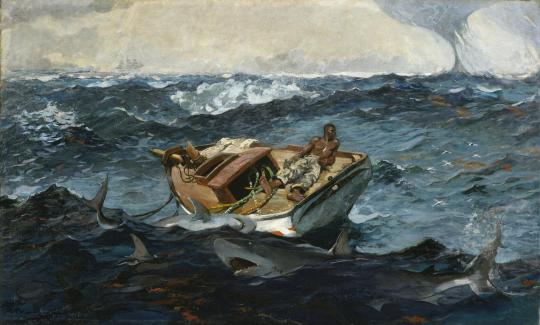
Winslow Homer | The Gulf Stream - 1899 - Metropolitan Museum of Art, New York City
The Gulf Stream shows a man in a small dismasted rudderless fishing boat struggling against the waves of the sea, and was the artist's statement on a theme that had interested him for more than a decade.
Chronologically the first of a series of major works painted by Homer in the last decade of his life, The Gulf Stream was painted in the penultimate year of the century, the year after the death of his father, and has been seen as revealing his sense of abandonment or vulnerability.

Winslow Homer | After the Hurricane - 1899
After the Hurricane, perhaps it's the sequel to The Gulf Stream, "is among Homer’s most astonishing and ambitious watercolors for its sheer technical virtuosity and epic subject matter"
An earlier painting 🔽
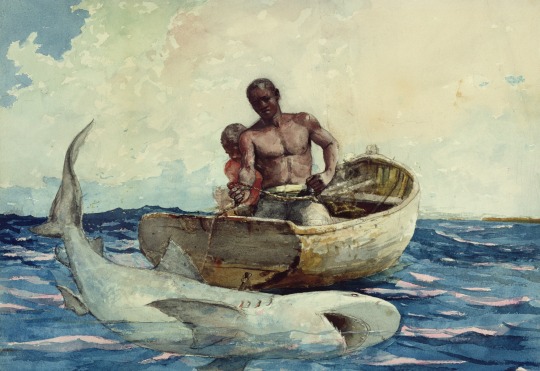
Shark Fishing - 1885

Homer in his studio. In 1859, he opened a studio in the Tenth Street Studio Building in New York City, the artistic and publishing capital of the United States.
Until 1863, he attended classes at the National Academy of Design, and studied briefly with Frédéric Rondel, who taught him the basics of painting. In only about a year of self-training, Homer was producing excellent oil work. His mother tried to raise family funds to send him to Europe for further study but instead Harper's sent Homer to the front lines of the American Civil War (1861–1865), where he sketched battle scenes and camp life, the quiet moments as well as the chaotic ones.
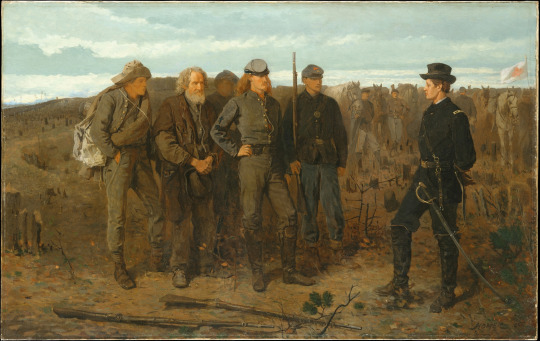
Winslow Homer - Prisoners from the Front - 1866 - now housed in the Metropolitan Museum of Art in New York City
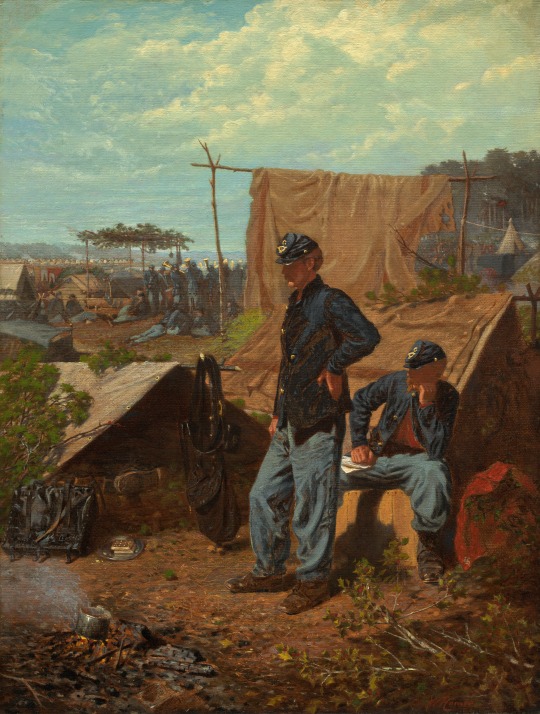
Winslow Homer - Home, Sweet Home - 1863 - National Gallery of Art, Washington, D. C
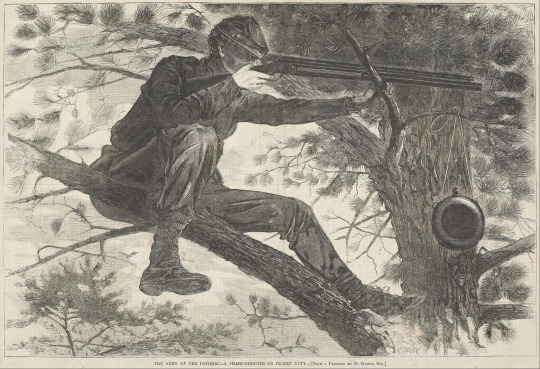
Winslow Homer - The Army of the Potomac - A 'Sharp-Shooter on Picket Duty' during the American Civil War - 1862 - wood engraving on paper. Smithsonian American Art Museum
#homer#winslow homer#After the Hurricane#vintage photography#art#paintings#The Gulf Stream#1899#artists#sharp shooter#civil war#potomac#Prisoners from the Front#Sharp-Shooter on Picket Duty
96 notes
·
View notes
Text
THIS DAY IN GAY HISTORY
based on: The White Crane Institute's 'Gay Wisdom', Gay Birthdays, Gay For Today, Famous GLBT, glbt-Gay Encylopedia, Today in Gay History, Wikipedia, and more … FEBRUARY 24


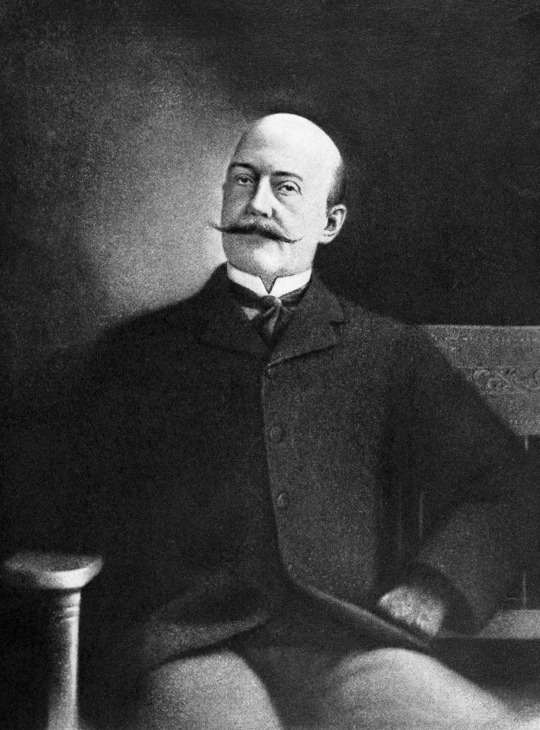
1836 – Winslow Homer (d.1910) was an American landscape painter and printmaker, best known for his marine subjects. One of the most prolific and important American painters and printmakers of the second half of the nineteenth century, Winslow Homer created a distinctly American, modern classical style.
Homer dealt with many of the same themes that writers such as Henry Thoreau, Herman Melville, and Walt Whitman did, including the heroism displayed by ordinary individuals, when confronted by seemingly insuperable difficulties; the camaraderie and friendships enjoyed by soldiers and working men; and the isolation of the individual in the face of the "Other."
Born in Boston on February 24, 1836, Homer was initially trained as an artist by his mother, Henrietta Benson Winslow, who successfully exhibited watercolors of flowers and other still life subjects throughout her adult life.
Between 1855 and 1857, he was apprenticed to John H. Bufford, a nationally prominent commercial artist, based in Boston; with this training, he began to do free-lance work for Harper's Weekly and other magazines.
In 1861, Homer was commissioned by Harper's Weekly as a special artist/correspondent to record the events of the Civil War. Homer failed to produce the heroic battle scenes that his editors had wanted. Yet his images of the daily lives of ordinary soldiers greatly appealed to the magazine's readers and helped to establish his reputation.
Among other subjects, he represented guard duty (A Sharp-Shooter on Picket Duty, wood engraving, 1867); punishments for minor infractions (A Punishment for Intoxication, painting, 1863); medical care for the wounded (The Surgeon at Work at the Rear During an Engagement, wood engraving, 1862); and recreation (Soldier Dancing, drawing, 1862).

The Empty Sleeve at Newport
As the war ended, Homer revealed the personal "costs" of the conflict in such images as The Empty Sleeve at Newport (wood engraving, 1865), which represents a one-armed man, riding in a carriage with a sad, aloof well-dressed woman.
Very little is known about Homer's "private" life. He consistently refused to answer personal questions from critics and potential biographers, and he left no revealing diaries or other personal papers. His reclusiveness is indicated by the fact that he produced no self-portraits; in contrast, most American and European painters of the nineteenth century eagerly exploited the rapidly growing market for images of artists.
Most historians have adamantly maintained that Homer remained a bachelor because he was extraordinarily "shy" around women. However, it would seem more plausible to suggest that Homer simply may not have been interested in women sexually.
Constructing Homer as a solitary eccentric, who virtually withdrew from human society, most scholars have overlooked evidence of significant, intimate associations with other men.
One of his closest friends was Albert Kelsey, a fellow artist whom he initially met in 1858 in Massachusetts. In 1867, Kelsey traveled with Homer to Paris, where they lived together for the next two years.
A studio photograph, made while they were in Paris, mimics the conventions of marriage portraits, as do so many photographic portraits of male friends of this period. Kelsey inscribed the back of the photograph with the names "Damon and Pythias," famous ancient Greek heroes and lovers.In the 1890s, Homer remembered their friendship in the humorous and erotically suggestive drawing "Albert Kelsey riding a giant turtle in the Bahamas."
Homer's closest companion in the final years of his life was an African-American man, Lewis Wright, who worked as his servant and lived at his Prout's Neck, Maine estate from 1895 to 1910. There are indications that some of Homer's acquaintances were disconcerted by the apparent closeness of his friendship with Wright. While most "negative" reactions involved race, other "unmentionable" factors may also have been involved.
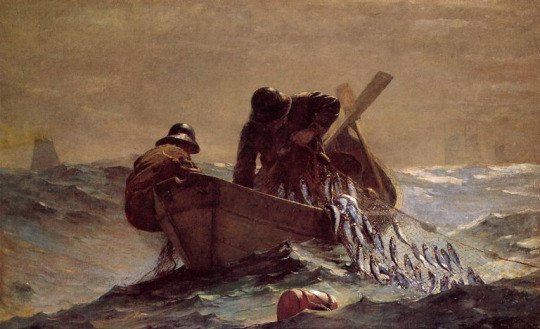
The Herring Net
Throughout his career, Homer created images that celebrated diverse aspects of male friendships. Thus, he depicted soldiers, unified in melancholy longing for peacetime home life (Home, Sweet Home, 1863); wilderness guides enjoying the beauties of nature (Two Guides, 1871); and fishermen laboring together (The Herring Net, 1885) and coping with dangerous storms (The Signal of Distress, 1890).
Homer died on September 29, 1910 in Prout's Neck, Maine.

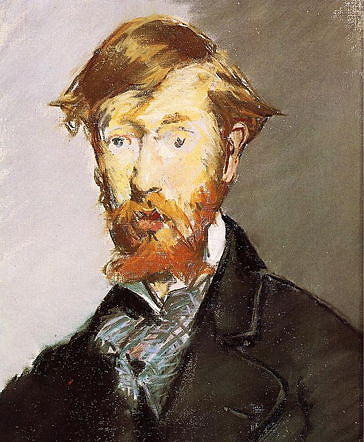
1852 – The Irish novelist, short-story writer, poet, art critic, memoirist and dramatist, George Moore was born on this date (d.1933). Moore came from a Roman Catholic landed family. He originally wanted to be a painter, and studied art in Paris during the 1870s. There, he befriended many of the leading French artists and writers of the day.
As a naturalistic writer, he was amongst the first English-language authors to absorb the lessons of the French realists, and was particularly influenced by the works of Émile Zola. His writings influenced James Joyce, according to the literary critic and biographer Richard Ellmann, and, although Moore's work is sometimes seen as outside the mainstream of both Irish and British literature, he is as often regarded as the first great modern Irish novelist.
According to Brian Lacey's new book, Queer Creatures: A History of Homosexuality in Ireland, Moore outed his good friend, the artist Edward Martyn, in his three-volume masterpiece Hail and Farewell (published between 1911 and 1914). Moore, who was attracted to the handsome young Yeats, later fell in love with the celebrated French painter Edouard Manet, who painted three portraits of him. Moore was influenced by the homosexual Oxford critic Walter Pater, and Moore's 1879 work, "Flowers of Passion," already contained references to Lesbianism. Moore's 1887 novel, A Mere Accident, also has a homosexual theme and its central character is again based on Martyn.

1868 – The first parade to have floats is staged at Mardi Gras in New Orleans, Louisiana.

1938 – A California appellate court upholds an oral copulation conviction of a man in a hotel after naval investigators listened in and heard his bed squeaking.

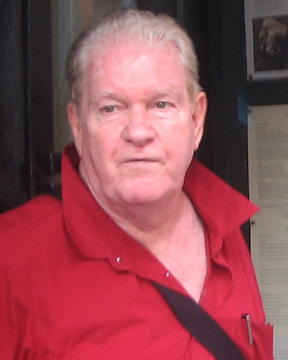
1939 – Doric Wilson (d.2011), the American playwright, was born on this date. Some people write for the "alternative" theatre because they aren't good enough for Broadway. Doric Wilson wrote for it because he was too good for the Great White Way.
Wilson was one of the first playwrights at NYC's legendary Caffe Cino, his comedy "And He Made A Her" opening there in 1961. Other Cino productions followed, including "Now She Dances!" (one-act version), "Babel Babel Little Tower " and "Pretty People" .
Street Theater, Wilson's best-known play, is a fictionalization of the Stonewall riots, an event in which Wilson took part. Using satire and exaggeration, Wilson recreates the milieu of street culture in Greenwich Village in the late 1960s, presenting characters variously described as "heavy leather, keys left," "a flower child," and "a street queen." The characters are archetypes representing both the disparate groups involved in the riot and also real people Wilson knew. A complex parody of Wilder's Our Town and Crowley's The Boys in the Band, the play is both deeply literary and deeply rooted in a particular time and place.
A veteran of the anti-war and civil rights demonstrations of the early 1960s-mid 1970s, Wilson was a participant in the Stonewall Riots. An active participant in the early gay liberation movement, Wilson was a member of the Gay Activists Alliance (GAA). He helped support himself as a bartender and manager of several bars and clubs that sprouted up in the wake of Stonewall, including such institutions as Spike, Ty's, and Brothers & Sisters Cabaret. Wilson's activism and his thorough immersion in New York's gay community are reflected significantly in his work.
In 1974, Wilson (with Billy Blackwell, Peter del Valle and John McSpadden) formed TOSOS (The Other Side of Silence), the first professional theatre company to deal openly and honestly with the gay experience. The company featured new plays and revivals by such writers as Brendan Behan, Noël Coward, Christopher Hampton, Charles Jurrist, Joe Orton, Terrence McNally, Robert Patrick, Sandra Scoppettone, Martin Sherman and Lanford Wilson. In June, 2001, Wilson, and directors Mark Finley and Barry Childs resurrected the company as TOSOS II. The original TOSOS and its production of Doric Wilson's play The West Street Gang are featured in "Perform", the new permanent exhibit on theatre at The Museum of New York City.
A pioneer in the Off-Off-Broadway movement, he was completely committed to alternative theater and over the past 25 years has written, directed and produced more than a hundred productions. Such plays as Forever After, A Perfect Relationship , and The West Side Gang made him not only "one of a handful of leading contemporary playwrights who deal frankly with the Gay experience," but a satirist of the first water whose targets - hypocrisy, cant, and simply human foibles - are universal.

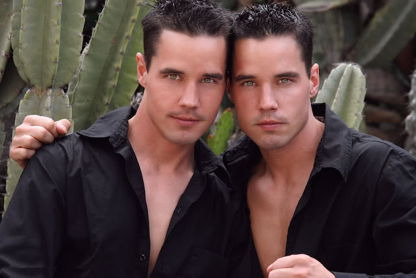
1975 – Gary Lane and Larry Lane, born in Goldsboro, N.C., are identical twin actors, models, film producers and screenwriters. They are both gay. The twins have appeared in feature films and national TV ads and are three-time grand prize champions of reality TV competitions. They are best known for a film they co-produced and appeared in, Hollywood to Dollywood, a feature-length documentary released theatrically in 2012. The film, about their quest to personally deliver a screenplay they've written to singer-actress Dolly Parton, played at 60 film festivals and won 24 festival awards.
Since the early 2000s, the Lane twins have appeared in feature films, TV programs, reality TV shows and TV commercials. As teenagers, they appeared on several episodes of Dawson's Creek and played twin colonial flag bearers in the Mel Gibson film The Patriot (2000). Other film appearances include Zoolander (2001), New Best Friend (2002), Spider-Man (2002), The Girl Next Door (2004), Eating Out 3: All You Can Eat (2009), and Jack and Jill (2011)
youtube
The Lane Twins talk of their life
The twins have competed on and won $50,000 on NBC's Fear Factor; beat out 24 other contestants for the grand prize of $50,000 on ABC's Winter Wipeout; and won $125,000 on the reality TV competition Set For Life. Gary Lane said their goal for appearing on these shows was to win money to pay for music rights and production costs associated with their documentary Hollywood to Dollywood. "For every wipeout, I would say, 'that was for Jolene, and for every ouch, 'that was for Coat of Many Colors!,'" Gary Lane said, referring to the need to raise money for licensing rights to hit Parton songs.
The Lane twins wrote a screenplay, Full Circle, which includes a role tailored for Dolly Parton. They submitted the script to Parton's management, but Parton's managers returned it as "unsolicited material." The twins decided to drive from Los Angeles, where they live, to Parton's theme park in Tennessee, Dollywood. The goal was to try and hand their script to Parton during one of her appearances at Dollywood's 25th anniversary celebration. In addition, the documentary explores the Lane twins' concerns about their Southern hometown's potential reaction to the film (and to the brothers' homosexuality) and their desire for acceptance from their Southern Baptist mother. Also on the journey is Gary's partner, Michael Bowen, who has crafted a birdhouse for Ms. Parton. The journey to deliver their screenplay is the focus of their documentary feature, Hollywood to Dollywood, which played at 60 film festivals throughout 2011 and 2012, winning 24 awards.
Parton makes an appearance in the film. After viewing the documentary, she gave the twins rights to use her music and likeness in its promotions. The Lane twins donate 10 percent of each Hollywood to Dollywood DVD sold to Parton's Imagination Library, an organization that provides free books to young children and is part of the Dollywood Foundation.

Today's Gay Wisdom:

George Moore
Faith goes out of the window when beauty comes in at the door. - George Moore
The mind petrifies if a circle be drawn around it, and it can hardly be denied that dogma draws a circle round the mind. - George Moore
A man travels the world over in search of what he needs and returns home to find it. - George Moore
A great artist is always before his time or behind it. - George Moore
I am filled with pride when I think of the noble and exalted world that must have existed before Christian doctrine caused men to look upon women with suspicion and bade them to think of angels instead. - George Moore
The world is dying of machinery; that is the great disease, that is the plague that will sweep away and destroy civilization; man will have to rise against it sooner or later. - George Moore
The difficulty in life is the choice.
- George Moore



26 notes
·
View notes
Photo
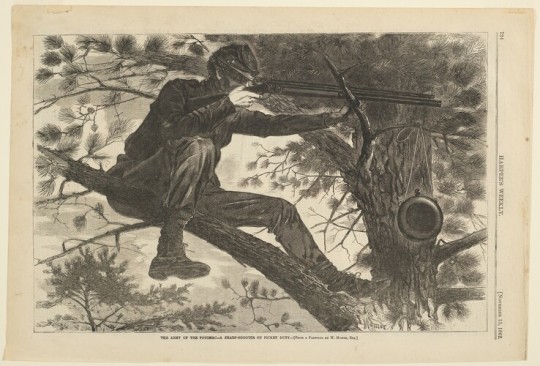
The Army of the Potomac - A Sharp-Shooter on Picket Duty - [From a Painting by W. Homer, Esq.], Winslow Homer, 1862, Harvard Art Museums: Prints
Harvard Art Museums/Fogg Museum, Acquisition Fund for Prints
Size: image: 23.2 × 34.9 cm (9 1/8 × 13 3/4 in.) sheet: 27.6 × 40.2 cm (10 7/8 × 15 13/16 in.)
Medium: Wood engraving and letterpress on cream laid paper
https://www.harvardartmuseums.org/collections/object/362465
4 notes
·
View notes
Photo

The Army of the Potomac--A Sharp-Shooter on Picket Duty, Winslow Homer, 1862, Brooklyn Museum: American Art
Size: Sheet: 9 1/16 x 13 5/8 in. (23 x 34.6 cm) Frame: 16 3/4 x 22 3/4 x 1 1/2 in. (42.5 x 57.8 x 3.8 cm)
Medium: Wood engraving
https://www.brooklynmuseum.org/opencollection/objects/159614
1 note
·
View note
Text
Six Sentence Sunday, deleted scene 1
This was originally going to be the first chapter of With a Smile and a Song. First chapter was going to be Sam’s pov and second chapter Billy’s, but the whole thing became way too dark for the premise and also veered into territories that I as I white person and not american felt uncomfortable writing about and had not researched enough, plus again, it felt insensitive for the rather frivolous subject. And I had wanted to have Sam in it but in the end that layout turned into two characters of colour talking about a white person so I ditched the idea. I might try to re-purpose it later for a Sam & Goodnight (or Sam/Goodnight) story.
The scrubland is dry for miles and miles and the sun is beating on Sam’s shoulders when he approaches the well and comes up on a brawl.
Actually a brawl is a gross misrepresentation, what he can see is a company of ten men beating a single man on the ground. There is no reason for him to interrupt them, his errand is with another man, but maybe it’s the pitiful wail or the fleeting glimpse of a white hand, large-knuckled and bony wrists, curling around a head, in between rough boots, and in any case Sam has never been able to stick to his own business, so he halts his horse and intercedes.
“He done something?” he asks, nodding towards the prone person on the ground and the men turned around, like children with their game spoiled. He spotted a few blue caps between them, a tarnished insignia here and there, so they are army men then. The world had not been kind to old soldiers, not that it ever had been, Sam had forged himself a new life, becoming a ranger and duty sworn warrant officer, sliding like a smooth layer on top of the soldier. And now he is here, six shooters comfortably on his hips,the star on his chest, staring down a crowd of men with calm authority. The man on the ground has a grey coat, so Sam supposes the root of the argument does not need explaining.
“You know who this is?” one of them asks, a burly white man with a shock of blonde hair, bleached almost white by the sun.
Sam looks over at the man on the ground, he looks mostly like a bundle, the coat ingrained with dirt, the only thing visible a scrawny neck and that feeble hand trying to ward off the attack. He’s bleeding from his nose, streaming red across his face, dirt and blood stuck in his beard.
“Can’t say that I do,no.”
“This is the goddamn Angel of Death, Goodnight Robicheaux.”
Sam looked down on the ground again, and shrugged. “War’s over,” he pointed out mildly.
Still, whatever sympathy Sam had felt for the man dwindled away fast. He might be on the ground now, but how many times had the position been reversed? This man fed and clothed and served on the backs of others? It might do him good to be on the ground for a while. But all the same, if the kicking continued he would die, sure as anything. If he even pulled through now.
“War’s never over,” the man, Robicheaux says, in a voice that sounds like its coming from the bottom of a well. “...Of names once fam'd, now dubious or forgot, And buried ‘midst the wreck of things which were; There lie interr'd the more illustrious dead.”
His voice die away in a wet hitching laugh, blood bubbling from his nose, the men look from him and up to Sam again, the blond man raising his eyebrows and Sam hitches his chin at him, away towards the horses.
“I guess we’d better get going boys,” he says, and still looking Sam dead in the eyes he aims a vicious kick, hitting Robichaux in the ribs. Sam tried not to wince at the sound, watching them mount their horses and disappear, in no particular hurry. After they have gone, there is a distinct lack of riderless horse and Sam sighs, deep and heartfelt. He supposes he might as well camp here for the night.
Dismounting he looks down at Robicheaux, he’s a scrawny white man with a narrow nose, his forehead and cheeks pink and mottled from the desert sun, with an unkept beard and dust ingrained into his greasy hair. He’s not really sure what he expected, the tales told of a man who’d just as soon smile at you as shoot you in the face, silver-tongued like the snake in the garden of Eden. Robicheaux’s mouth is bleeding and there are bruises already rising on his cheek and temple. It’s likely that his ribs are broken.
“You alive down there?” he asks and Robicheaux opens his eyes, startlingly blue and stared up at Sam.
“”In grim array the grisly spectres rise, Grin horrible, and obstinately sullen, Pass and repass, hush’d as foot of night. Again the screech-owl shrieks……””
The eyes focused on Sam slowly and the man smiles at him, a horrible rictus grin made worse by the gaping black hole of a missing tooth, his eyes shining maniacally. “Every night we rise up, and up, we the colorless dead from our graves, the restless sleeper from his pallet. Once more unto the breach, once more…il faut laisser les morts ensevelir les morts…” he says, eyes staring and unseeing. His hand on the ground have two fingers broken, already swelling.
Sam recoiled a little, that was unsettlingly morbid, coming from that grinning skull of a face, before setting up camp and hauling water, refilling his canteens and water his horse. It’s a fine animal, a lovely chestnut brown mare with a white star on his forehead named Comet, not that Sam ever used it, never having the need to call the horse anything. “Hey you” seemed to do just as well. The horse was usually an unperturbed sort of animal but now she was dancing and tossing her head, refusing to stand still and tugging against her picket while Sam set up camp.
He had a fire going and tin of beans nestled in the coals when Robicheaux sat upright, and Sam sighed, of course food would make the man move, but instead of coming closer to the fire Robicheaux crawled over to Comet, half lying by her massive hoofs.
“Hey! Get away from her,” Sam called suspicious, granted he didn’t look like he was in any shape to steal Sam’s horse but Robicheaux is undeterred slowly running a clumsy and shaking hand along her left front leg.
“Hush now, cher,” Sam hears him murmur, a string of soothing nonsense, “we’ll get it sure ‘nuff, so we will, yes, yes..”
“Hey, Robicheaux,” Sam calls again and ambles over, if this crazy man lames Sam’s horse in the middle of ass-end nowhere Sam is going to have to shoot him, and that’s just that.
Robicheaux is rubbing his eyes with a dirty hand when Sam reaches them, his eyes sliding away along the ground but he wordlessly holds out half a Foxtail grass awn to Sam, the sharp barbs could twist and twist into the skin of an animal, causing no end of misery.Its obviously dug out from the sensitive area just above the hoof, Sam himself must have missed it.
“Huh, how on earth did you know that was there?” And Robicheaux looks up, gives him a smile which is nothing more than a nervous grimace.
“Horse told me so,” he says and Sam decides, what the heck, the man can have some beans after all.
Comed adore Robicheaux after that and Sam thought it was typical that a man who kept people as property would be soft-hearted about animals.
They rise at first light and Sam points towards the nearest settlement, not really willing to let Robicheaux ride double with him but also not quite willing to leave him in the dust just yet. He could hear him waking up in the night, murmuring disjointed strings of words. The moon was full and shining on them, sometimes so bright it seemed nearly to be day. His mama always said that sleeping in the moonlight would make you crazy, not that he’s sure there would be a noticeable difference in Robicheaux.
They had been making their way, Sam ahead on Comet, letting the horse walk slow and Robicheaux picking his way behind them, the sky turning a warm pink and the full moon just a faint silver disc low on the horizon when Sam spotted something ahead of them on the trail.
It was a horse, large and grey, almost glowing in the early morning light, with liquid dark eyes and flared nostrils, the white colored mane falling silkily over the broad forehead. It whickered lowly and Sam could feel Comet answer but when he came closer it backed away, tossing its head.
The grass rustled faintly as Robicheaux came up alongside him and walked past with one hand stretched out. The horse backed away a couple of paces before coming closer, slowly nuzzling the outstretched hand, slowly letting Robicheaux stroke its neck and flanks. Sam wasn’t sure if he really believed his eyes when it slowly lowered its head and bent the front legs at Robicheaux’s feet. The man gripped the mane and swung one leg over and the animal got to its feet, docile and tame as a cow. Sam had never believed in magic, or in his mother’s stories about Uncle Jack who trapped the devil himself in his purse, but he had to admit this was the strangest thing he’d ever witnessed with his own two eyes.
“You know horse theft is a hanging offence?”
“Good thing I didn’t steal her then,” Robicheaux answered. “No markings or brands on her. Too big to be a wild mustang and no iron shoes on her hooves.”
“Yes, but..” Sam says, in his, not inconsiderable, experience, horses don’t just turn up because you need them (he’s even sure he heard a fella in a play say something to that effect once).
“We’ll bring her back to - and is she has an owner they’d be right pleased to see her,” Robicheaux says, seemingly untroubled about the prospect of being shot for a horse thief. It is just the first in a long string of odd animal related events as they start travelling together.
#the magnificent seven#sunday six#Delete scenes#with a smile and a song#Sam Chisolm#sam & goodnight#Goodnight is quoting#The Grave#by Robert Blair#which is another tenuously feasible literary reference
5 notes
·
View notes
Photo

Winslow Homer - The Army of the Potomac - A Sharp Shooter on Picket Duty, Harper's Weekly, Nov. 15, 1862, page 724, wood engraving
Winslow Homer (1836-1910) is an American landscape and seascape painter and printmaker who is mostly self taught. Homer began his career as a comercial artist. He worked as an artist correspondent during the American Civil War.
#sharp shooter#winslow homer#soldier#1862#united states#nineteenth century#wood engraving#illustration#shooting#rifle#Civil War#american artist
1 note
·
View note